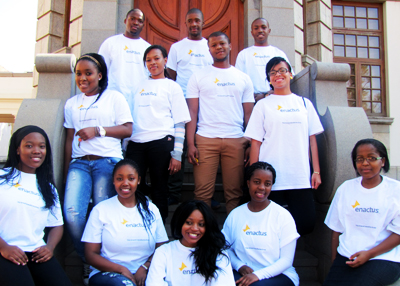 |
The Kovsies Enactus team
24 May 2013
Photo: Linda Fekisi |
The Students in Free Enterprise, better known as SIFE, has changed its brand name to Enactus. This global rebranding took place late last year. It forms part of an attempt to increase the organisation’s level of reach and impact. It reflects that entrepreneurial action is not something that is relevant to a single culture or nationality.
The organisation is still in essence one which assists university students to create community empowerment projects. The Kovsies Enactus team has 53 active members on the Bloemfontein Campus.
“We encourage student development through Enactus. It is a great platform for students. There is a combination of ideas, expertise and diversity from different faculties,” says the Vice-Chairperson of internal affairs, Mirriam Matsoaboli.
Enactus is currently working on three major projects: Local Economic Development (LED) and Edcon, Shifting Focus, and an environmental project. LED works with 19 established businesses which are struggling to make a profit while Edcon deals with three designers in textile and clothes making. Shifting Focus forms part of the educational division. It focuses on instilling entrepreneurial skills in high school learners. The Enactus team serves as a mentoring structure and advises them. The environmental project is in its infant stage, with. Enactus working on recycling bottles and paper, especially old study guides on campus.
“Having a branch on the QwaQwa campus has also been one of our objectives. We are still in the process of establishing one,” adds Mirriam.
The Enactus team is currently preparing for the national competitions which will take place later in Sandton on 10 and 11 July.
- Students tell us about your association and we will profile it on our Kovsielife page. Contact Amanda Tongha at tonghaa@ufs.ac.za